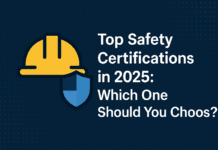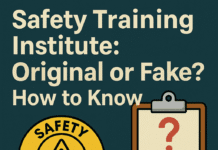
Safety Courses in United States: A Comprehensive Guide
Introduction
Safety Courses in United States : In a world where safety is paramount, the United States offers a wide array of safety courses designed to equip individuals with the knowledge and skills necessary to ensure the well-being of themselves and others. From workplace safety to emergency response training, these courses play a vital role in safeguarding lives and property. In this article, we’ll delve into the world of safety courses in the United States, exploring the various options available and their significance in today’s society.
Understanding the Importance of Safety Courses
Why Safety Training Matters
Safety is not a matter to be taken lightly. Accidents can happen at any time and in any place. Whether you’re in a corporate setting, an industrial facility, or even at home, being prepared can make all the difference.
Legal Requirements
Many industries and professions require employees to undergo specific safety training as mandated by federal or state laws. Understanding these legal obligations is crucial for both employers and employees.
Types of Safety Courses
Occupational Safety and Health Administration (OSHA) Training
OSHA offers a wide range of courses focusing on workplace safety. These courses cover topics such as hazard recognition, emergency response, and compliance with safety regulations.
First Aid and CPR Training
Knowing how to administer first aid and cardiopulmonary resuscitation (CPR) can be lifesaving. Courses in first aid and CPR provide essential skills for responding to medical emergencies.
Fire Safety Training
Fire safety courses teach individuals how to prevent fires, use firefighting equipment, and safely evacuate in the event of a fire. These skills are valuable both in the workplace and at home.
Emergency Response Training
In today’s unpredictable world, being prepared for emergencies is crucial. Emergency response courses train individuals to handle a wide range of crises, from natural disasters to terrorist threats.
Defensive Driving Courses
Defensive driving courses are designed to reduce accidents and improve road safety. They teach defensive driving techniques and strategies to help drivers avoid accidents.
Benefits of Safety Training
Enhanced Safety
The most obvious benefit of safety courses is the enhancement of safety in various environments. Well-trained individuals are better equipped to prevent accidents and respond effectively in emergencies.
Compliance
Safety courses ensure that individuals and organizations comply with relevant laws and regulations. This can prevent costly fines and legal issues.
Skill Development
Safety training imparts valuable skills that can be applied in everyday life. From administering first aid to using fire extinguishers, these skills are practical and beneficial.
Confidence
Having the knowledge and skills to handle safety situations breeds confidence. Confidence is a valuable asset in both personal and professional life.
How to Choose the Right Safety Course
Choosing the right safety course can be a daunting task. Consider factors such as your industry, job requirements, and personal interests. It’s also essential to research reputable training providers and read reviews from previous participants.
Conclusion
Safety courses in the United States are more than just a requirement; they are a lifeline. From preventing workplace accidents to responding to medical emergencies, these courses empower individuals to protect themselves and those around them. By investing in safety training, you’re not just meeting legal obligations; you’re ensuring a safer and more secure future for yourself and your community.
NIOSH: National Institute for Occupational Safety and Health
Occupational Health and Safety Career
JHSC Certification Training (Joint Health and Safety Committee)
Certificate of Recognition Auditor Certification (COR)
NCSO Certification (National Construction Safety Officer)
FAQs
1. Are safety courses mandatory in the United States?
In many industries, safety courses are mandatory to ensure compliance with federal and state regulations. Check with your employer or industry association for specific requirements.
2. How long do safety courses typically last?
The duration of safety courses varies depending on the type of training. Some courses can be completed in a few hours, while others may span several days or weeks.
3. Can I take safety courses online?
Yes, many safety courses are available online. However, it’s important to ensure that online courses are accredited and meet the necessary standards.
4. What certifications can I obtain through safety courses?
Safety courses can lead to various certifications, such as OSHA certifications, first aid and CPR certifications, and defensive driving certificates.
5. How often should I renew my safety certifications?
The renewal period for safety certifications varies by type and may range from one to three years. It’s essential to stay updated on renewal requirements to maintain your certifications.
























